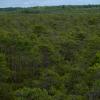
In the TaigaClimate project researchers develop a simulation-model of forest and wildlife management in the boreal forest ecosystem, which will be used to explore the impacts of climate change and how they can be best managed for the benefit of the stakeholders.
Climate change will bring storms, flood and forest fires, while warmer temperatures and elevated CO2 concentrations may increase plant growth in the boreal forests of northern Europe. These risks and opportunities are interacting and require long-term foresight to be successfully managed. TaigaClimate develops computation models of natural ecosystems and human activities, which are used to make forecasts of the future consequences of a changing climate and different management alternatives. To construct the model, the researchers use existing and new knowledge on all the important parts of the system, including trees and vegetation, moose and other herbivores, wolves and other predators, natural disturbances from storms and fire, and human activities. The project collaborates with the people affected by these changes (stakeholders), in particular forest owners, conservationists, hunters, berry and mushroom pickers, hikers and cabin owners. Their interest organisations play an active role throughout the entire project and help design likely future scenarios and survey alternative options for forest and wildlife management. This includes considering aspects on costs, benefits and preferences regarding economical, recreational, aesthetic and intrinsic values of the boreal forest.
The resulting model forecasts for different climate scenarios and management options will be used to identify how to best manage forests and wildlife, depending on the preferences of the stakeholders. As part of the project, the researchers will develop an online user tool to make this analysis transparent and accessible for the stakeholders and the public. The project is the first to make quantitative analyses of the long-term effects of climate change on Nordic wildlife populations and forest dynamics in a full ecosystem perspective and including human activities. This will help managers and stakeholders to shape a good future for the boreal forests, their wildlife, and their people.
Project Partners:
- Høgskolen i Innlandet Evenstad (Inland Norway University of Applied Sciences, Evenstad)
- International Institute for Applied Systems Analysis (IIASA)
- Norges Miljø- og Biovitenskapelige Universitet (Nmbu)
- Statskog (State owned forestry company)
- Skogbrukets Kursinstitutt (Forestry education institute)
- Glommen Mjøsen Skog (Forestry company)
- Norskog (Forestry company)
- Norges Naturvernforbund (Nature protection society)
- Norges Jeger- og Fiskerforbund (Norwegian hunting and fishing society)
- Naturvårdsverket (Swedish Environmental Protection Agency)
- Norges Sopp- og Nyttevekstforbund (Norwegian mushroom society)
- Skogsstyrelsen (Swedish Forest Agency)
- Svenska Jägareförbundet (Swedish hunters association)
Funder
 © The Research Council of Norway
© The Research Council of Norway
News

07 May 2024


